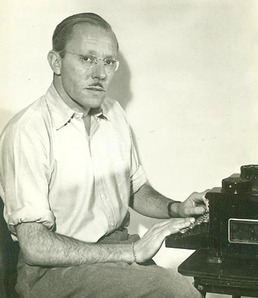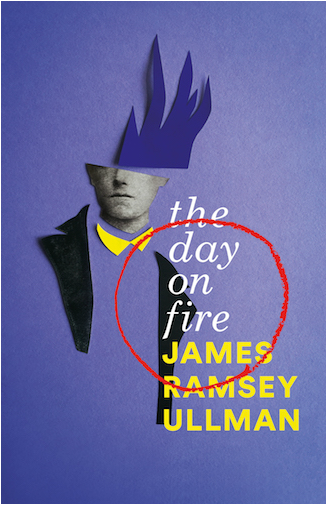|
BOOK DETAILS
Trade paper ISBN-13: 978-1943910441 List Price: $29.99 U.S. Pages: 664 Published: 2016 |
The Day on Fire (1958)
James Ramsey Ullman Book Description
By the age of fifteen, Arthur Rimbaud was already one of the most brilliant poets of his time. And for the next four years - and four only - Rimbaud (the Claude Morel of this book) was simultaneously a writer of genius, a visionary idealist, and a deliberate wallower in gutters of depravity perhaps unmatched in all of human experience. But at the age of nineteen, he was through forever with both writing and debauchery, and at this point, he all but vanished, spending most of his remaining years as a vagabond wanderer through Europe and Africa. In the epic The Day on Fire (1958), a masterwork of biographical fiction, James Ramsey Ullman retraces the steps of Rimbaud's life from his rebellious youth in a dull provincial town to his teenage years as a homosexual, drunkard and drug addict in Paris, and his later years, wandering the desert in search of some elusive beauty or truth. As Ullman writes in his Foreword, “The truth, the inward core, of Rimbaud's life, is a truth for all times, as long as each of us, all of us, have our nights alone and our days on fire, our seasons in hell and our hope of heaven.” |
reviews
“It comes close to being the best book we've ever read.” - Victoria Advocate
“A literary masterpiece ... One of the most forceful novels of our decade.” - Montreal Gazette
“A haunting tale with an obsessive fascination.” - Kirkus Reviews
“Shocking ... Ullman has succeeded in making believable a life whose terms would be considered absolutely unbelievable if we did not know that they were true.” - Chicago Tribune
“Engrossing ... a tragic life dramatically, poetically and compellingly visualized.” - Booklist
“A literary masterpiece ... One of the most forceful novels of our decade.” - Montreal Gazette
“A haunting tale with an obsessive fascination.” - Kirkus Reviews
“Shocking ... Ullman has succeeded in making believable a life whose terms would be considered absolutely unbelievable if we did not know that they were true.” - Chicago Tribune
“Engrossing ... a tragic life dramatically, poetically and compellingly visualized.” - Booklist
ALSO AVAILABLE THROUGH ONLINE RETAILERS
AUTHOR BIOGRAPHY

James Ramsey Ullman was born in New York in 1907. After his graduation from Princeton in 1929, he worked as a reporter for a Brooklyn newspaper and then turned to the theater, first as a playwright, and from 1933 to 1939 as producer or co-producer of a dozen Broadway plays. Beginning in 1939, aside from a stint with the American Field Service in Africa during World War II, Ullman was “a full-time writer—and roughly half-time traveler.”
Two trips to the Amazon jungle resulted in the writing and publication of The Other Side of the Mountain (1938), and the later novel, River of the Sun (1951), a Book-of-the-Month Club choice. Windom’s Way, a Literary Guild selection in 1952, is the story of an American doctor in Southeast Asia, and The Sands of Karakorum (1953) tells of a missionary’s disappearance in the interior of Communist China. Four of Ullman’s books were adapted as major motion pictures.
Travel, and particularly mountaineering, provided the physical background and spiritual core of most of Ullman’s books. He climbed in the Rockies, the Andes, the Alps, the Himalayas, and in Africa, where he reached the top of Kilimanjaro. Two of his novels, The White Tower (1945) and Banner in the Sky (1954), a novel for young readers, are set in the Alps, and Tiger of the Snows (1955) took him to India and Nepal to work with Tenzing Norgay, the Sherpa who, with Sir Edmund Hillary, made the first ascent of Mount Everest.
In 1957, Ullman traveled in Europe and Africa, retracing the steps of Arthur Rimbaud and gathering material for his great biographical novel, The Day on Fire (1958), which took him eighteen months to write.
Ullman died in 1971.
Two trips to the Amazon jungle resulted in the writing and publication of The Other Side of the Mountain (1938), and the later novel, River of the Sun (1951), a Book-of-the-Month Club choice. Windom’s Way, a Literary Guild selection in 1952, is the story of an American doctor in Southeast Asia, and The Sands of Karakorum (1953) tells of a missionary’s disappearance in the interior of Communist China. Four of Ullman’s books were adapted as major motion pictures.
Travel, and particularly mountaineering, provided the physical background and spiritual core of most of Ullman’s books. He climbed in the Rockies, the Andes, the Alps, the Himalayas, and in Africa, where he reached the top of Kilimanjaro. Two of his novels, The White Tower (1945) and Banner in the Sky (1954), a novel for young readers, are set in the Alps, and Tiger of the Snows (1955) took him to India and Nepal to work with Tenzing Norgay, the Sherpa who, with Sir Edmund Hillary, made the first ascent of Mount Everest.
In 1957, Ullman traveled in Europe and Africa, retracing the steps of Arthur Rimbaud and gathering material for his great biographical novel, The Day on Fire (1958), which took him eighteen months to write.
Ullman died in 1971.

